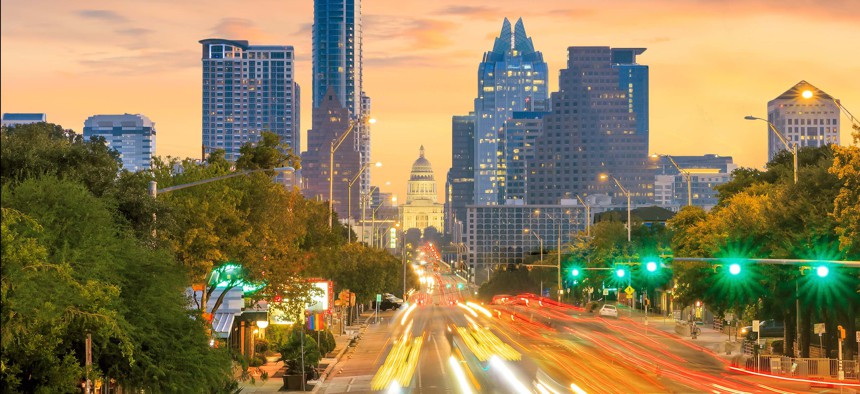Mayors Press Biden's Transportation Nominee on Direct Funding for Cities

Austin, Texas. Shutterstock
"You've actually helped lobby on this very issue before," Austin's mayor reminded Pete Buttigieg, himself a former mayor.
When Mayor Steve Adler of Austin, Texas had a chance to pose a question to President Biden's pick for transportation secretary, Pete Buttigieg, during an online forum on Saturday, Adler opted to remind the cabinet nominee of an issue that Buttigieg is likely well aware of from his time as mayor of South Bend, Indiana.
That's the prevailing sense among many city officials that too much federal "formula funding" for transportation flows to state transportation departments, and that more should go directly to the local level. Adler's comments were a sign of how there is new hope among mayors that having someone from their own ranks in the nation's top transportation job could bring new attention to this and other priorities city leaders care about.
Adler lauded Buttigieg's pledge to work on areas like traffic safety and transportation policies linked to climate change. But "the state department of transportation status quo is not working. In fact, it's the very source of so many of our climate and equity problems," said Adler—whose own city has endured "preemption" battles, where state leaders have sought to override local policies they disagree with.
"Failing to increase the formula funds to local governments is throwing good money after bad. It is the structural flaw that leads to an inhibition on innovation," the Austin mayor added. "You've actually helped lobby on this very issue before," he told Buttigieg. "The necessary change puts us in conflict with the states."
Adler went on to ask Buttigieg where Biden stands on this funding question and what he thinks will happen with it. Buttigieg didn't say directly whether the White House would push for changes on this front, but he did offer some insight into what the new administration's approach to it could look like and described Biden as "a believer in the power of the local, in the meaning of local leadership."
"This is certainly something that I'll be working to emphasize," he said. "Not just in terms of my own department, but more broadly. Making sure that we have an eye out for those moments where there is preemption, or where good opportunities, or just good funding, is getting attenuated or redirected or buffered in a way that doesn't work because of the old ways of having it always flow through the states."
The transportation nominee noted that considering how federal funding is distributed to the state and local level is especially important at a time when the Biden administration and Democratic lawmakers are backing the idea of heavy spending to aid in the nation's recovery from the coronavirus pandemic.
"In case after case," Buttigieg said, "often the most shovel-worthy projects are those that are put forward at that local level."
The exchange unfolded during the U.S. Conference of Mayors winter meeting, which is taking place online this year due to the coronavirus.
Biden's election has also rekindled interest in the possibility of a major new infrastructure package of some sort, at a time when a five-year transportation funding law, which Congress extended last year, is set to expire in September. Buttigieg said it's too soon to say whether certain infrastructure proposals Biden's team has discussed could be rolled into a reauthorization for the expiring law, as opposed to a standalone bill, or as part of a pandemic recovery package.
He also highlighted that Obama-era transportation secretary Anthony Foxx, who was mayor of Charlotte, North Carolina before holding the cabinet post, devoted attention to issues around direct local funding during his tenure, with a $40 million federal grant competition, known as the "Smart City Challenge," serving as one example.
"There are a lot of headwinds and structural factors that make it hard," Buttigieg said as he responded to Adler's question about how federal transportation funds are divvied up between the state and local level. "One of the first things I want to dig in on once in the building is to really understand where some of that institutional inertia is."
Funding tensions don't only exist between the state and local levels. Nan Whaley, mayor of Dayton, Ohio urged Buttigieg not to forget his roots as a mid-sized city mayor and how bigger cities with more resources at their disposal "always beat us out for the money."
"I know that you'll remember that the middle-sized mayors have just as much need," she added. "I just wanted to remind you of that."
Whaley also echoed the kind words and excitement expressed by other mayors about having one of their former colleagues take the helm at the Transportation Department. Whaley told him that he had "rocked it" during his Senate confirmation hearing earlier this week. "You're making us super proud as mayors," she added.
Bill Lucia is a senior reporter for Route Fifty and is based in Olympia, Washington.
NEXT STORY: NC registry to track COVID among responders






